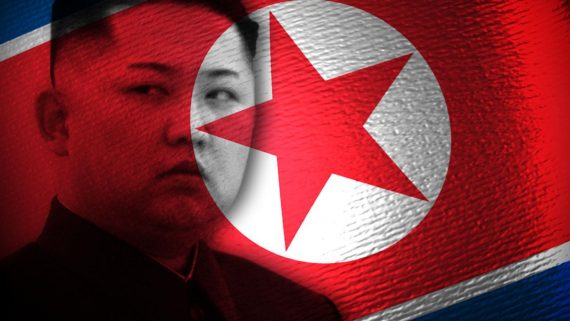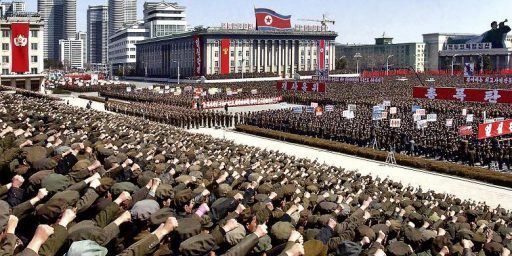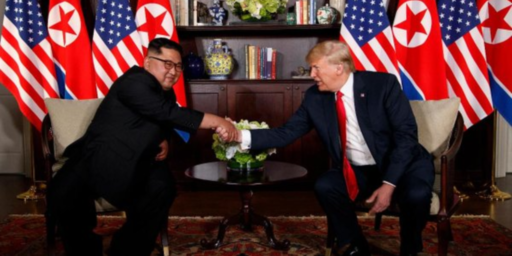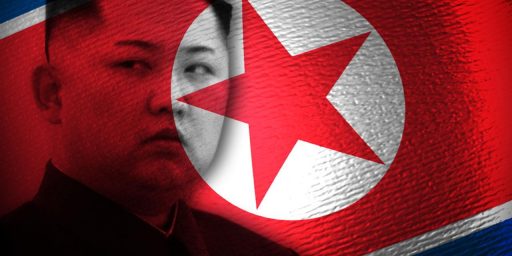Tensions Rise On Korean Peninsula As North Korea Threatens Another Nuclear Test
North Korea is threatening another nuclear test, the United States is threatening retaliation, and China is warning of a 'gathering storm' on the Korean Peninsula.
With North Korea set to celebrate one of the biggest days on its calendar tomorrow, tensions are rising on the Korean peninsula amid reports that the DPRK may use the occasion to conduct another nuclear weapons test, and the United States reportedly upping the ante with threats of retaliation if it does:
The U.S. is prepared to launch a preemptive strike with conventional weapons against North Korea should officials become convinced that North Korea is about to follow through with a nuclear weapons test, multiple senior U.S. intelligence officials told NBC News.
North Korea has warned that a “big event” is near, and U.S. officials say signs point to a nuclear test that could come as early as this weekend.
The intelligence officials told NBC News that the U.S. has positioned two destroyers capable of shooting Tomahawk cruise missiles in the region, one just 300 miles from the North Korean nuclear test site.
American heavy bombers are also positioned in Guam to attack North Korea should it be necessary, and earlier this week, the Pentagon announced that the USS Carl Vinson aircraft carrier strike group was being diverted to the area.
The U.S. strike could include missiles and bombs, cyber and special operations on the ground.
The danger of such an attack by the U.S. is that it could provoke the volatile and unpredictable North Korean regime to launch its own blistering attack on its southern neighbor.
“The leadership in North Korea has shown absolutely no sign or interest in diplomacy or dialogue with any of the countries involved in this issue,” Victor Cha, the Korea Chair at the Center for Strategic and International Studies told NBC News Thursday.
On Wednesday, North Korea said it would “hit the U.S. first” with a nuclear weapon should there be any signs of U.S. strikes.
On Thursday, North Korea warned of a “merciless retaliatory strike” should the U.S. take any action.
“By relentlessly bringing in a number of strategic nuclear assets to the Korean peninsula, the U.S. is gravely threatening the peace and safety and driving the situation to the brink of a nuclear war,” said North Korea’s statement.
North Korea is not believed to have a deliverable long-range nuclear weapon, according to U.S. experts, nor does it yet possess an intercontinental missile.
South Korea’s top diplomat said today that the U.S. would consult with Seoul before taking any serious measures. “U.S. officials, mindful of such concerns here, repeatedly reaffirmed that (the U.S.) will closely discuss with South Korea its North Korea-related measures,” Foreign Minister Yun Byung-se told a special parliamentary meeting. “In fact, the U.S. is working to reassure us that it will not, just in case that we might hold such concerns.”
“Two things are coming together this weekend,” said retired Adm. James Stavridis, former commander of NATO and an NBC analyst. “One is the distinct possibility of a sixth North Korean nuclear weapons detonation and the other is an American carrier strike group, a great deal of firepower headed right at the Korean Peninsula.”
The U.S. is aware that simply preparing an attack, even if it will only be launched if there is an “imminent” North Korean action, increases the danger of provoking a large conflict, multiple sources told NBC News.
“It’s high stakes,” a senior intelligence official directly involved in the planning told NBC News. “We are trying to communicate our level of concern and the existence of many military options to dissuade the North first.”
“It’s a feat that we’ve never achieved before but there is a new sense of resolve here,” the official said, referring to the White House.
The Chinese, meanwhile, are warning of a gathering storm on the peninsula in what seems like an attempt to warn the north to back away from its aggressive and confrontational approach:
HONG KONG — China warned on Friday that tensions on the Korean Peninsula could run out of control, after North Korea said it could test a nuclear weapon whenever its top leader, Kim Jong-un, decided, and as an American naval group neared the peninsula in a show of resolve.
“The United States and South Korea and North Korea are engaging in tit for tat, with swords drawn and bows bent, and there have been storm clouds gathering,” China’s foreign minister, Wang Yi, said in Beijing, according to Xinhua, the state news agency.
“We urge all sides to no longer engage in mutual provocation and threats, whether through words or deeds, and don’t push the situation to the point where it can’t be turned around and gets out of hand,” Mr. Wang said after meeting with his visiting French counterpart, Jean-Marc Ayrault, according to Xinhua.
“No matter who it is, if they let war break out on the peninsula, they must shoulder that historical culpability and pay the corresponding price for this,” Mr. Wang said.
His comments were the bluntest this week from China, which has been trying to steer between the Trump administration’s demands for it to do more to stop North Korea’s nuclear weapons program and its longstanding reluctance to risk a rupture with the North, its neighbor and longtime partner. In a phone conversation with Mr. Trump on Wednesday, China’s president, Xi Jinping, also called for restraint.
The North Korean military issued a statement on Friday threatening to attack major American military bases in South Korea, as well as the presidential Blue House, warning that it could annihilate those targets “within minutes.”
With a United States Navy strike group led by the aircraft carrier Carl Vinson diverted to the region, North Korea’s vice minister, Han Song-ryol, said on Friday that the United States was “becoming more vicious and aggressive” under President Trump and that “we will go to war if they choose.”
Mr. Han said whether North Korea holds another nuclear test would be “something that our headquarters decides.” But he added an ominous coda: “At a time and at a place where the headquarters deems necessary, it will take place.”
Mr. Han’s remarks, made to The Associated Press, typified the often bellicose language of the North’s leaders and its state news media. But as Pyongyang’s weapons technology rapidly advances and the United States is led by an unpredictable new president, some of its neighbors were examining worst-case scenarios.
The Japanese news media reported that the government’s National Security Council had been discussing the possible evacuation of an estimated 57,000 Japanese citizens in South Korea, should war break out. “We will take all necessary steps to protect our people’s lives and assets,” said Yoshihide Suga, Japan’s chief cabinet secretary. The Kyodo news agency said the council was concerned about the possibility of North Korean refugees arriving in boats on its shores.
Prime Minister Shinzo Abe of Japan expressed concern on Thursday that North Korea could have the ability to deliver missiles equipped with sarin, the nerve agent whose recent use against civilians in Syria prompted Mr. Trump to order a missile strike there.
Russia, another neighbor of North Korea, echoed China in urging all parties on Friday to exercise caution. A Kremlin spokesman, Dmitri S. Peskov, called on “all the countries to refrain from any actions that could amount to provocative steps,” Reuters reported.
In South Korea, whose people have lived through saber-rattling involving the North for decades, there were few signs of panic. Nonetheless, the South Korean Foreign Ministry warned on Friday that if the North conducted another nuclear test or launched an intercontinental ballistic missile, it would suffer an “unbearably strong punishment.” All the major candidates in the presidential election set for next month have called on the United States not to do anything that might initiate war on the peninsula without first seeking the consent of South Korea, its military ally.
All of this comes, of course, at the same time that a battle group led by the USS Carl Vinson has taken up position within striking distance of North Korean targets, including the area where a nuclear test would be carried out if that is indeed what the DPRK has planned. Along with the Vinson’s complement of aircraft, this group includes two destroyers armed with the same type of Tomahawk cruise missiles that recently struck a Syrian airfield in response to that nation’s use of chemical weapons. Additionally, the United States has other military assets in the area, including both Japan and South Korea, as well as longer-range equipment stationed at American bases in areas such as Guam that would theoretically be capable of reaching North Korea and carrying ordinance far more powerful than the warhead on a Tomahawk missile. In other words, we’re at the point that if the United States wanted to launch a pre-emptive or retaliatory attack on North Korea it has all the assets it needs to carry it out.
Of course, it’s not quite as easy as that.
First of all, it’s unlikely that even this President would launch any attack on North Korea without first consulting with allies and other parties in the region. Most notably, of course, there are the South Koreans, who would be most directly impacted by whatever happens on the peninsula. As I’ve noted many times in the past, North Korea has an extensive and massive military force on their side of the Demilitarized Zone that includes artillery and rockets capable of reaching downtown Seoul, a city of more than ten million people with little to no warning. They also have the capability to strike out against American military bases in the South. If the United States hits the DPRK in response to a nuclear test, the regime in Pyongyang could choose to respond by retaliating against civilians, an action that would seem likely to set off a chain or events that could quickly spin out of control toward war. Alternatively, it could choose to retaliate against military targets in the south, including areas where American forces are based. Also vulnerable to retaliatory action from the north would be Japan, which is also the home of a sizeable American military force. And, of course, the Chinese are an interested party here and would likely object to anything that would bring chaos and a flood of refugees to their border.
Second, it’s hard to tell from what’s unfolding right now how seriously we ought to take the change in tone from the United States from previous Administrations. There’s a long history, of course, of Washington condemning previous North Korean nuclear and missile tests, but it’s always stopped there. Even when the North Koreans went so far as to attack and sink a South Korean naval vessel several years ago, and attack that resulted in the deaths of dozens of South Korean sailors, there was no retaliation from either South Korea or the United States. In no small part, this is due to the risks that even a limited military strike on North Korea could invite the kind of retaliation I refer to above, or that it could spin out of control to the point where armies are facing off against each other on the peninsula for the first time since the armistice in 1952. Or, we could be looking at some sort of elaborate ‘good cop/bad cop’ move between the United States and China where the Chinese attempt to persuade the North Koreans to back down by pointing at American actions and rhetoric and saying ‘We have no idea what this new guy Trump is going to do.’ That last bit, of course, would require far more coordination between the United States and China than we’ve seen in the past, and it would fall apart if the North Koreans decide to call the bluff and go ahead with the test anyway. In that case, if there isn’t a response stronger than what we’ve seen in the past then that would potentially send a message of weakness to the north that would lead them to believe they can act with impunity in the future. It would also undercut the ability of this Administration, or future Administrations, to credibly use the threat of force to keep North Korea in line.
As I’ve said in the past, there doesn’t seem to me to be any easy solution to the situation on the peninsula at this point. While it seems likely that the regime that Kim Il Sung founded will collapse as certainly as the Soviet Union and its empire in Eastern Europe collapsed in 1989, it’s not something that’s likely to happen soon. It’s also unlikely that limited military action is going to hasten that day without causing widespread problems for the region that would best be avoided. This leaves all of the interested parties — the United States, China, South Korea, and Japan — with something of a dilemma. With limited options and the threat that even limited military action could lead to a wider war, the actual options for forcing change are limited at best. The idea in the past has always been that, ultimately, it’s the Chinese who have the best ability to influence events in Pyongyang given their relationship and the fact that they are essentially the only remaining major nation that is willing to act as a customer for North Korean raw materials such as coal. As we’ve seen in recent years, though, the scope of China’s ability to influence events in the north may not be as extensive as previously believed. Additionally, the regime of Kim Jong-Un seems especially interested in asserting independence from China and dismissing the notion that Kim is nothing more than a Chinese puppet. As some analysts have noted, there is one thing the Chinese could do that would likely have a big influence on North Korean actions, and that would be to cut off the supply of oil the DPRK receives given that most of it gets to the north either through or via China itself. Taking that step, though, could quickly throw the nation into chaos and cause the regime to lash out against its neighbors as outlined above.
Like I said, no easy answers.
In any case, if North Korea does use this weekend’s big anniversary (the 105th anniversary of the birth of Kim Il Sung) to conduct another test, we should find out rather quickly whether we’re headed for a new world crisis or not.






The US behavior (aka Trump’s behavior) in all this must be giving the jitters to all of Asia. This may or may not recede as an immediate issue, but it’s already done a great deal of harm to our standing. The three obvious outcomes:
1) NK doesn’t detonate the bomb. This is the best possible outcome. Trump will get a lot of credit amongst his supporters.
1A) Trump keeps his mouth shut and lets others toot his horn for him. Best outcome
1B) Trump starts tweeting about how he made Baby Kim his b*tch. At that point Kim is in danger of appearing weak to his own people. He may feel he has nothing to lose in retaliating by giving nuclear materials to a terrorist group, or worse.
2) NK detonates the bomb. We do nothing but talk. We look very weak and China is strengthened substantially. NK starts planning their next step.
3)NK detonates the bomb. We take military action based solely on US (Trump’s) interests. We have done nothing to cultivate a group reaction. The correct way would be if SK and/or Japan were taking the lead and requested our help. Instead we will go in and put a billion or more Asian lives at risk based on Trump’s incompetence. The Asian world, heck, the entire world, will view this as an unsteady US, led by an incompetent buffoon, picking fights in Asia because we don’t care about anyone who isn’t Christian and White. Many Asian countries will look to China to act as a buffer and a brake on a dangerous US.
It’s not a well told story in the US, but Obama and Clinton very patiently and skillfully turned 12-15 Asian nations around and moved them away from China’s influence. In fact, Hillary Clinton is hated by the Chinese leadership because they feel she thwarted them during their strongest period (especially humiliating because she is a woman). I would guess that we have lost an awful lot of that headway simply by electing Trump and putting the Republicans in charge of congress. This has the potential to lose what we have left and a lot more. And if war actually does break out, the Asian world will most certainly turn against us. 4.3 billion people and 40% of the worlds economy arrayed against us.
Our leadership has gotten so used to being able to bomb nations that can’t strike back (cheered on by a compliant media) that its hard to fathom a situation where bombing could precipitate a gigantic conflict. All we can hope is that calmer voices are talking both erratic leaders down.
Very good piece by Doug, very good summary by @MarkedMan.
I will demur slightly. As I’ve said at tedious length, Trump is a classic psychopath, and that may actually work in this situation, if chubby Kim believes Trump’s crazy. Kim plays the crazy to advantage when dealing with rational leaders, but going up against a fellow psychopath is more complicated.
It will come down to a question of Kim’s survival. Either canceling a test is a) something he can absorb, or b) it’s something that will trigger a fatal loss of face and a coup. If (a) then he may back down, and Trump will get credit for a non-event. If on the other hand Kim thinks backing down means he gets strung up like Mussolini, he’ll face a different choice: he can hope Trump will back down in which case Kim scores. Or he may end up going out in a blaze of glory.
If he can back down, he may. If he can’t, he won’t. Then we’ll see whether our psychopath backs down.
Something to remember: we threatened Saddam twice, and he did not back down. we threatened Assad, and he did not back down. We threatened Kruschev in 1956 and Brezhnev in 1968 and neither backed down. Kim’s military power is far greater than Saddam’s and his grip on power is less certain.
@michael reynolds:
This is the crux of it. Saddam and the WMD is instructive here. Although it is easy to say we were completely played by the evil Bush/Cheney who knew Saddam didn’t have WMD’s and merely wanted to go to war to avenge Daddy Bush’s honor, this is dangerously simplistic. Many, many people thought they had them, and for good reason. Saddam’s own top generals thought he had them. As we learned after the war, he had the military so compartmentalized each general thought the other ones had the bad stuff. In fact, they regularly conducted training exercises and developed strategies surrounding various scenarios of deployment for these nonexistent weapons. I’m sure we had lots of top level intel reporting on this. Even at the end, when Saddam was letting in the inspectors and desperately trying to convince us he didn’t have them (truthfully) he was attempting to convince his generals (falsely) he had the power to gas the hometowns of anyone who put a toe out of line.
The relevancy: a dictator who ruled by fear and surrounded with enemies and who certainly knew his country would be crushed if the enemy invaded still wouldn’t give up the illusion of WMD’s because he knew his own people would turn on him in an instant. And, like Assad in Syria, he was
willing to see his country destroyed rather than go willingly. Baby Kim actually has the WMD’s, nuclear, chemical and probably biological. Republicans like Trump are always talking about how you just have to show these losers who is boss and they will back down. But that’s not the way the “losers” see it.
@MarkedMan: My personal bet would be your #2 – that DPRK sets off their nuclear test and the US responds with talk.
I think that in considering Kim Jung Un’s sense of vulnerability there is a lot of material. His purges seem to have been deep and to have astonished the Confusian world by murdering his uncle and half-brother.
There will be lots of deep thinking in chancelleries around the world when (if I am correct) the essential cowardliness of bullies such as Pres Trump becomes a factor in diplomacy for the rest of this presidential term. I doubt this will work out to the benefit of the U.S.
And – somewhat off topic — despite what the original post says, the Korean Armistice did not occur in ’52. Maybe it’s a small and insignificant fact but facts have some meaning. The date was 27 July 1953.
North Korea indulges in brinksmanship because that’s how it gets free cash and prizes.
With a petty dictator at the helm who couldn’t operate a lemonade stand, let alone a country, North Korea will remain an economic basket case that will drive its reliance on saber rattling. This will remain the case until something else happens, and nobody knows what that something is.
Not sure what Trump or the other members of the Breitbart School of Foreign Policy think that they can possibly do about it. It’s international affairs, not a bar fight.
@michael reynolds:
Face saving is really important in east Asian cultures. Is trump the sort of fellow to offer face-saving gestures, or does he prefer humiliating adversaries?
Um, yeah.
This.
My only hope is that whatever action is (not) taken, it will be chosen on the basis of likely outcomes, and not on wanting to do something, or wanting to look strong, or simple testosterone or petulance. Such a very low bar, yet I am not at all confident.
So it looks like Baby Kim held a parade showing off his missiles instead of setting off the bomb. Will Trump be able to stop himself from publicly gloating?
@MarkedMan: They appear to be big missiles, or big mock ups of missiles. Will Trump be able to stop himself from panicking?
I continue to think the right approach is increasingly higher tariffs on the Chinese until they either cut off trade with North Korea, or remove Baby Kim. I’d rather risk a trade war than a hot war.
Pressuring China into military action would be a huge mistake. The Chinese have not had active military engagements in two generations. We would like to keep it that way.
@charon: You really need to ask? :-/
I see that according to S. Korea the North fired a test missile earlier today, the day after the big parade, and it failed. We won’t keep being that lucky.
Those missile tests had a strange way of failing lately when Obama was prez too. Almost like the the US is sabotaging them…
https://www.nytimes.com/2017/03/04/world/asia/north-korea-missile-program-sabotage.html